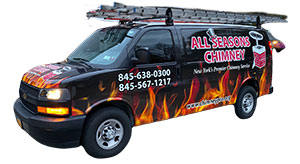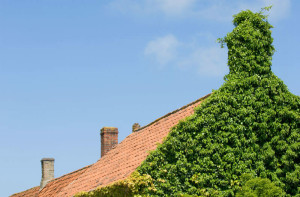While the English ivy that is growing along your masonry chimney may look beautiful, it could be severely damaging your chimney. Brought to the United States by European immigrants over two centuries ago, English ivy grew quickly in popularity because it was such an attractive and low-maintenance groundcover. People soon learned, however, how invasive and aggressive this plant could be as it began to suffocate trees and cause structural damage. At All Seasons Chimney, we have seen the damage caused by this climbing vine, and we would like to share with you more about how ivy can cause major problems with your masonry chimney.
How exactly can ivy damage my chimney?
English ivy grows with clusters of roots along the stems, which excrete a sticky liquid to help it adhere to brick, mortar, concrete, and wood. If your masonry chimney is in good shape with no erosion or spalling damage, this climbing vine may grow along your chimney without causing any damage. However, if your chimney contains cracks in the bricks and mortar and is missing pieces of masonry, English ivy can grow into these cracks and even worsen the damage to the bricks and mortar. If your chimney was built before 1930, you can have an even bigger problem. According to Today’s Homeowner, homes built before 1930 were constructed with mortar that does not contain Portland cement, which means this mortar is much more likely to erode over the years. If your older chimney is currently covered with English ivy or another climbing vine, contact us at All Seasons Chimney to inspect the condition of your chimney’s exterior. You do not want to check this out yourself by attempting to pull the ivy away. If your chimney is cracked, the ivy has typically grown into these cracks, and pulling the ivy down can result in pulling down your entire chimney structure!
What other kinds of problems can result from ivy growing on my chimney?
Birds, rats, and other animals and insects love to live in ivy and can easily enter your home through the chimney or through missing pieces of bricks and mortar. Ivy can also trap moisture against the masonry of your chimney that can cause even further structural damage from erosion.
What can I do if I like the look of ivy growing up my chimney?
You can have the exterior of your chimney inspected for cracks and loose bricks to ensure the ivy cannot grow into the masonry. You may want to try to contain the growth of the ivy by training it to climb exactly where you want. You can also choose a less aggressive climbing vine, such as roses, that will not threaten the masonry work of your chimney. Installing some sort of support like a trellis for the vine to grow along is also an excellent idea for those who appreciate the look of ivy and climbing vines.
To prevent English ivy and other climbing vines from damaging your masonry chimney, contact us at All Seasons Chimney. We can inspect the condition of the exterior of your chimney and make recommendations for repairs, if needed.


